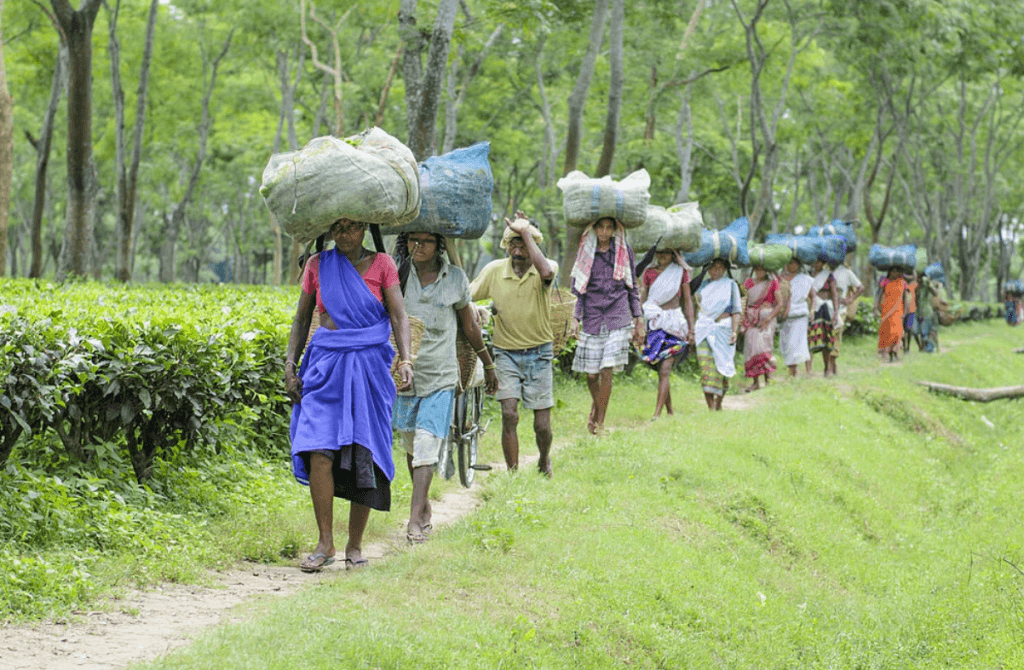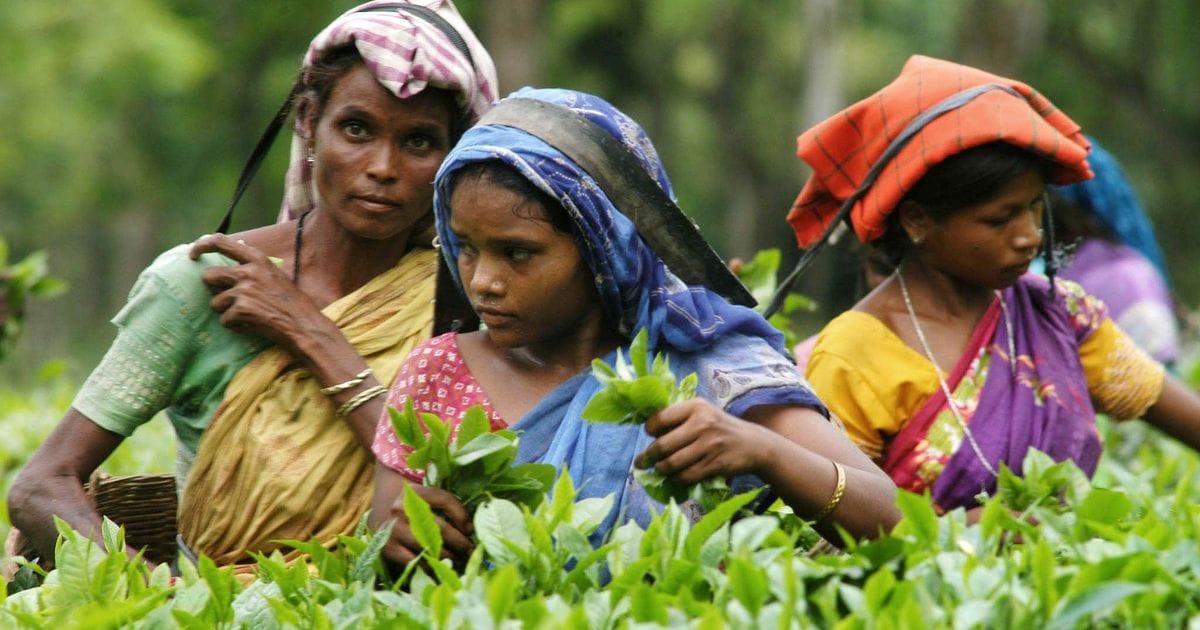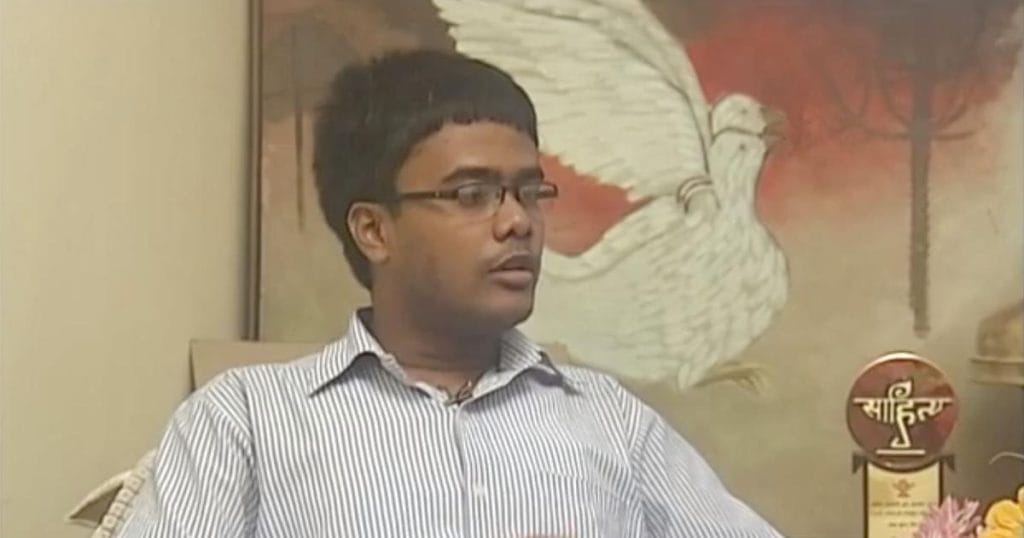As per the 2007 statistical evidence from the Tea Board of India, the country is second in the position of tea production and consumption in the world. When we savour every mouthful of a cup, we do not even know tea workers are exploited at the same time. The most affected and marginalised are women who are coerced to sell their labour for low wages, which is insufficient to sustain their livelihood. Profits go into the hands of plantation owners, managers, and company giants. In tea plantations, caste, class, and gender intersection dictates extreme socio-economic-political backwardness.
The tea plantation was laid out as a colonial unit during British rule. Despite gaining independence in 1947 and the formulation of the Plantation Labour Act, 1951, its legacy continues to thrive upon labour exploitation, which is a form of modern slavery. Although ‘modern slavery‘ has no place in the legal domain, the United Nations recognises it.
Though the Labour Act implementation is better in Kerala and Tamil Nadu than in Assam and West Bengal, and the British commenced tea industrialisation in Assam in the early nineteenth century, it is not a strenuous task to look into the miserable conditions of the tea workers through lesser-known poems.
So, here are 5 lesser-known poems that elucidate the inhumane plight of the tea workers.
1. Ek garam chai ki pyali mai kya harj hai? by Adil Hussain
It is well-known from films, such as English Vinglish and What Will People Say, that Adil Hussain is a phenomenal actor. But his illuminating poem on the miserable and isolated conditions of tea workers in India raises concerns pertaining to the same. He belongs to Assam, and his association with Oxfam India stimulates him to foster awareness about their vulnerability.
“Ha, Agar Aap Assam ki Chaibagaan mai Kaam Nahin Karte toh koi Harj Nahin
(You do not feel regret having a cup of tea unless you work in the tea gardens in Assam.)
Yaha ke chaibagaan ki labourers ki baat hi kuch alag hai
Yeh log Zyada Paani Nahin Peete Kyuki na hi Yahan Bathroom hai na hi Bathroom Jaane ki Chhoot.”
(These tea labourers are unique. They do not drink enough water because there is neither a bathroom nor do they have freedom to access it.)
Hussain mentions multiple issues of workers in tea gardens in Assam. Even though it is a one-minute poem, it can arouse consciousness about the pain they endure on the fields.
2. Darjeeling Tea by Bibhusha Rai
Darjeeling Tea is a poem that secured the second prize in the Wingword Poetry competition in 2022. Bibhusha Rai’s belongingness to Darjeeling’s village made her experience the exploitation of tea workers by corporates who own their labour. Her poem is for people who enjoy Darjeeling tea, which is unique because of its high-quality aroma, to have a glance at the tea workers in the area who do not get fair wages for selling their labour power.

The labour and dedication women and men have been bound to put in for generations to extract tea leaves from rough hilly areas do not have its full-fledged ownership. Through her poem, she condemned the politics of ‘otherness‘ inflicted upon the workers who have lived on the land for generations. In its gist, Bibhusha’s poem speaks against discrimination meted out to unpaid and overworked workers who contribute their hard work and dedication to satiate people’s thirst for tea.
Furthermore, her frustration comes out through the poem regarding basic rights, including education and jobs that are inaccessible to the workers who live in the area.
“Men and Women
Toil for Tea
Sweat and Blood
Running Through the Hills
But the Tea
Isn’t Owned by them
Belonging to Corporations
Run by people
From Outside.“
3. Fikka Chiya by Srijana Subba
Srijana Subba hails from a tea garden hamlet in Darjeeling and demonstrates through her short poem the struggle of low-paid tea workers to get an acceptable bonus. Bonus is a right to sustain workers’ livelihood and their children’s dreams.

“Coolies Gather at the Factory
And Shout for 22% Bonus
Oh! Then Does Saheb Give 22%
I Don’t Think so
This Year also
They will Bargain
And Shed their Crocodile Tears
Of Company running on Loss“
This poem finds its relevance in a 2024 demonstration where tea workers participated at the Labour Commissionerate in Siliguri, West Bengal, to demand a 20 percent bonus that is the maximum permissible rate under the Payment of Bonus Act, 1965, in the aftermath of the State Government asking tea planters to pay at the rate of 16 percent. The workers put forth, ‘We are not begging’ and ‘We are asking for our rights.’ They are low-paid workers who sell their labour to manufacture expensive teas. They cannot even expect increments if the production declines.
4. The Tea Plant by Udoi Kumar Baruah
He comes from Guwahati, Assam. In his poem, he penned the generational bondage of tea workers in the region. It radiates workers’ urge to break free. Three words are mentioned in the poem : blood, sweat, and toil of a labourer who works for unfixed hours on the fields, whose labour is exploited by owners and companies to build up their future.
“We are the centre of a world of artifice
Would you listen to the woeful ballad of those who bearing only deceit
After their loyalty to our service from dawn to dusk
whose blood-sweat-toil are used as fuel by a few narcissists
To run the train of their dreams“
This poem could be understandable through an instance of the migration of workers during the colonial period from Bengal, the United, and the Central Provinces, etc. And from tribes, such as Munda, Kol, Gauda, Bheel, etc., to Assam with hopes to live a fulfilling and prosperous life. In Assam’s folklore and songs, one can comprehend the pathetic conditions under which the workers live. There is a regional song that reflects coercion and deception directed at the labourers.
5. Kamal Kumar Tanti and his poems against injustice and racial discrimination
Kamal Kumar Tanti is a poet from Assam, known for communicating progressive thoughts through his poems that resulted in winning him the Sahitya Akademi Yuva Puraskar in 2012. His clear stance against exploitation and oppression of workers is worth noticing. He mentions indigenous people have their own history to tell the world. He notices the intersection of society, culture, and human experiences. His collection of poems translated to ‘Post-colonial Poems‘ touches upon cultural transformations of adivasi workers who were displaced from their indigenous lands to Assam. They had to go into the assimilation of mainstream culture.
“I am History : of two lost centuries
Of centuries lost in the time of the colonial
Of centuries lost in the time of the colonised“
History is the crux of his poetry, which enunciates British colonial policies that led indigenous people from Bihar and other central regions to turn into tea garden workers in Assam.
About the author(s)
Nashra Rehman finds her profound interest in addressing the plight of Muslim women and their unappreciated marginalisation. Her focus remains on bringing a novel argument to life.







Nashra, thank you so much for including my poem ‘Darjeeling Tea’, which is very dear to my heart. It is a privilege to be featured alongside such good poets and important poems on the plight of our country’s tea workers. I am very grateful to ‘Feminism in India’ as well for giving space to our tea workers’ lived realities and rights.